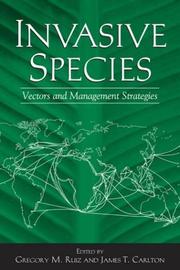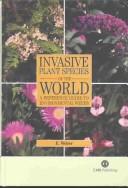| Listing 1 - 7 of 7 |
Sort by
|
Book
Year: 2003 Publisher: Nairobi IUCN
Abstract | Keywords | Export | Availability | Bookmark
 Loading...
Loading...Choose an application
- Reference Manager
- EndNote
- RefWorks (Direct export to RefWorks)
ECO Ecology --- wetlands --- Africa --- invasive species --- aliens
Book
Abstract | Keywords | Export | Availability | Bookmark
 Loading...
Loading...Choose an application
- Reference Manager
- EndNote
- RefWorks (Direct export to RefWorks)
Hungary --- alien species --- aliens --- conservation --- invasive species --- nature protection --- noxious insects

ISBN: 1559639024 Year: 2003 Publisher: Washington Island Press
Abstract | Keywords | Export | Availability | Bookmark
 Loading...
Loading...Choose an application
- Reference Manager
- EndNote
- RefWorks (Direct export to RefWorks)
ECO Ecology --- invasive species --- invasive alien species ( IAS ) --- invasions --- nature conservation --- biodiversity --- ecological management --- global biodiversity strategies --- symposium proceedings
Periodical
Year: 2003 Publisher: Washington, DC : USDA, Economic Research Service
Abstract | Keywords | Export | Availability | Bookmark
 Loading...
Loading...Choose an application
- Reference Manager
- EndNote
- RefWorks (Direct export to RefWorks)
Book
ISBN: 9057821354 9789057821356 Year: 2003 Publisher: Leiden: Backhuys,
Abstract | Keywords | Export | Availability | Bookmark
 Loading...
Loading...Choose an application
- Reference Manager
- EndNote
- RefWorks (Direct export to RefWorks)
Introduction de plantes --- Plant introduction --- Plante sauvage --- Wild plants --- Dynamique des populations --- population dynamics --- Compétition biologique --- Biological competition --- ECO Ecology --- aliens --- invasions --- invasive species --- Plant invasions --- Invasive plants --- Control --- Ecology --- Plant invasions - Congresses --- Invasive plants - Control - Congresses --- Invasive plants - Ecology - Congresses

ISBN: 0520928482 9780520928480 0520233204 9780520233201 Year: 2003 Publisher: Berkeley
Abstract | Keywords | Export | Availability | Bookmark
 Loading...
Loading...Choose an application
- Reference Manager
- EndNote
- RefWorks (Direct export to RefWorks)
Ecological restoration, the attempt to guide damaged ecosystems back to a previous, usually healthier or more natural, condition, is rapidly gaining recognition as one of the most promising approaches to conservation. In this book, William R. Jordan III, who coined the term "restoration ecology," and who is widely respected as an intellectual leader in the field, outlines a vision for a restoration-based environmentalism that has emerged from his work over twenty-five years. Drawing on a provocative range of thinkers, from anthropologists Victor Turner, Roy Rappaport, and Mary Douglas to literary critics Frederick Turner, Leo Marx, and R.W.B. Lewis, Jordan explores the promise of restoration, both as a way of reversing environmental damage and as a context for negotiating our relationship with nature. Exploring restoration not only as a technology but also as an experience and a performing art, Jordan claims that it is the indispensable key to conservation. At the same time, he argues, restoration is valuable because it provides a context for confronting the most troubling aspects of our relationship with nature. For this reason, it offers a way past the essentially sentimental idea of nature that environmental thinkers have taken for granted since the time of Emerson and Muir.
Restoration ecology. --- animal population. --- biological diversity. --- communion with nature. --- community. --- conservation. --- ecology. --- ecosystem. --- environment. --- environmentalism. --- flora and fauna. --- habitat. --- humans in nature. --- indigenous culture. --- indigenous people. --- invasive species. --- landscape. --- meditation. --- natural world. --- nature. --- nonfiction. --- plains. --- plants. --- prairies. --- reinhabitation. --- reintroduction. --- relationship with nature. --- relaxation. --- restoration ecology. --- restoration. --- science. --- spirituality. --- tidal marsh. --- vegetation. --- wetlands. --- wild animals. --- wilderness.

ISBN: 0851996957 Year: 2003 Publisher: Wallingford : CABI Publishing,
Abstract | Keywords | Export | Availability | Bookmark
 Loading...
Loading...Choose an application
- Reference Manager
- EndNote
- RefWorks (Direct export to RefWorks)
Plant ecology. Plant sociology --- Phytogeography --- Végétation --- vegetation --- Introduction de plantes --- Plant introduction --- Dynamique des populations --- population dynamics --- Compétition biologique --- Biological competition --- Écologie --- ecology --- world --- ECO Ecology --- invasive species --- weeds --- worldwide --- Invasive plants --- Weeds --- -632.51 --- 581.522.6 --- Pest plants --- Weed plants --- Weedy plants --- Plant pests (Plants) --- Agricultural pests --- Botany, Economic --- Plants --- Plant invaders --- Alien plants --- Plant invasions --- Control --- Migration. Dissemination --- -Control --- 581.522.6 Migration. Dissemination --- 632.51 Weeds --- 632.51 --- Crops --- Eradication of weeds --- Suppression, Weed --- Weed control --- Weed eradication --- Weed management --- Weed suppression --- Vegetation management --- Herbicides --- Eradication --- Management --- vegetation. --- Lutte
| Listing 1 - 7 of 7 |
Sort by
|

 Search
Search Feedback
Feedback About UniCat
About UniCat  Help
Help News
News